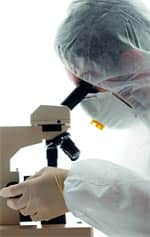Life Extension Magazine®
In recent years, a growing body of research has established the many health-promoting benefits of green tea, which may include protection against coronary heart disease, stroke, osteoporosis, infections, and other conditions.1 Laboratory and epidemiological studies suggest that this long-valued beverage may help prevent and manage certain cancers. Last year, for example, an article published in the prestigious British medical journal The Lancet (and reprinted in the January 2005 issue of Life Extension) noted that a review of green tea’s effects on human leukemia cells “provides a strong scientific basis for the chemopreventive property of green tea that has been inferred from several epidemiological studies.”2 According to The Lancet article, “the importance of nutraceuticals in cancer prevention and treatment remains largely under-exploited despite increasing evidence showing that these molecules have chemopreventive and chemotherapeutic ability . . . Green tea and other diet-derived compounds . . . offer several advantages as anti-cancer products, because these compounds are non-toxic, produce few side effects, are widely available, and are cheap.”2 Despite mounting evidence of green tea’s cancer-preventive effects published in prestigious medical journals, the FDA recently denied a petition that would have allowed companies that make green tea products to include a health claim on their product labels. The proposed health claim would have advised consumers that green tea, when ingested at certain levels, helps fight cancer. While the petitioner cited 135 studies in support of the proposed health claim, the FDA’s “systematic review” considered only certain human studies while ignoring the other evidence.
In a statement released on June 30, 2005, Michael Landa, deputy director for regulation at the FDA Center for Food Safety and Applied Nutrition, wrote that the current scientific evidence from human studies does not support the proposed health claim for green tea. He explained that while some studies showed that green tea decreased risk for breast and prostate cancers, others did not.3 According to Landa, “Two studies do not show that drinking green tea reduces the risk of breast cancer in women, but one weaker, more limited study suggests that drinking green tea may reduce this risk. Based on these studies, FDA concludes that it is highly unlikely that green tea reduces the risk of breast cancer.”` Landa also wrote, “One weak and limited study does not show that drinking green tea reduces the risk of prostate cancer, but another weak and limited study suggests that drinking green tea may reduce this risk. Based on these studies, FDA concluded that it is highly unlikely that green tea reduces the risk of prostate cancer.”3 Landa also noted that the FDA excluded from its review some Japanese research on stomach cancer because dietary salt intake in Japan differs from that in the US. In short, the FDA concluded that the existing evidence does not support a qualified health claim associating green tea consumption with a reduced risk of breast, prostate, or any other type of cancer. The agency stated that it will evaluate any new evidence that becomes available to determine whether to change its decision. Italian Study Contradicts FDA PositionContrary to the FDA’s claims, a breakthrough clinical trial in Italy study found that green tea indeed is effective in preventing prostate cancer in men at high risk for developing the disease.4 Led by Salverio Bettuzzi, PhD, a team comprising researchers from two Italian universities demonstrated that green tea catechins were 90% effective in preventing prostate cancer in men with pre-malignant lesions.4
Prostate cancer is the second most commonly diagnosed cancer in men after non-melanoma skin cancer.5 According to the American Cancer Society, more than 232,000 new cases of prostate cancer will be diagnosed this year in the United States alone. While often slow to develop, prostate cancer can be lethal—more than 30,000 US men will die from the disease this year. Laboratory research has long shown that green tea catechins, including epigallocatechin-3 gallate (EGCG), inhibit cancer cell growth. However, results from the new Italian study—which were presented at the 96th annual meeting of the American Association for Cancer Research in April 2005—demonstrate that green tea can prevent prostate cancer in men with pre-cancerous lesions.4 Men at risk for prostate cancer should thus give serious thought to adding green tea or green tea supplements to their diets. Bettuzzi and his colleagues recruited 62 men, aged 45-75, with high-grade prostatic intraepithelial neoplasia, a pre-malignant condition that leads to prostate cancer within one year in nearly one third of all cases. Excluded from the study were vegetarians, consumers of green tea or green tea products, and men who had used antioxidants or anti-androgenic therapies.4 Thirty-two subjects received 200 mg of green tea catechins (50% EGCG) three times daily, while the other 30 men received a placebo. Biopsies were conducted at six months and one year later. Remarkably, only one man in the treatment group was diagnosed with prostate cancer, compared to nine men in the control group who developed the disease. No side effects or adverse reactions were reported in the subjects who received the green tea catechins.4 “A projection of our data suggested that up to 90% of chemoprevention efficacy could be obtained by [green tea catechin] administration in men prone to developing prostate cancer, such as the elderly, African-Americans, and those with a family history of prostate cancer,” Dr. Bettuzzi noted. He and his team will follow the study’s participants for five years, and they hope to conduct a larger confirmatory trial in the future.
Possible Mechanisms of ActionWhile green tea contains numerous potential cancer-fighting compounds, studies suggest that its anti-cancer activity is primarily associated with the catechin known as EGCG. With a chemical structure similar to substances found in red wine and vegetables such as broccoli, EGCG’s superior bioavailability (or ability to be absorbed into the body) may account for its effectiveness. As to how green tea prevents cancer, the research to date indicates that green tea has several chemopreventive mechanisms of action:
Other research suggests that green tea catechins may also work by suppressing the formation of heterocyclic amines (toxic compounds created during the grilling of food),13 supporting liver pathways and enzymes that detoxify undesirable compounds,14,15 and behaving like methotrexate, a drug used to treat cancers of the breast, lungs, blood, bone, lymphatic system, and uterus.16 | ||||||
Green Tea and Cancer PreventionNumerous animal and human cell studies suggest that green tea catechins may act as powerful inhibitors of cancer,17,18 particularly colon, rectal, and prostate cancers,19,20 as well as cancers of the lung, stomach, and kidney.21 Green tea catechins appear to be effective chemopreventive agents against a variety of carcinogens. In addition to laboratory studies, population studies tracking the health of large groups of people who drink tea in abundance demonstrate the cancer-preventive benefits of green tea. Population studies have found reduced cancer rates in Asian countries where green tea is a dietary staple.22,23 In one Asian study, tea drinkers were about half as likely to develop stomach or esophageal cancer as men who drank little tea, even after adjusting for smoking and other health and dietary factors24 Japanese men, who commonly drink four to six cups of green tea daily, also have significantly lower rates of cancer incidence and mortality than Westerners.18,25
It has long been noted that the lung cancer rate in Japan is one of the lowest in the world, despite that nation’s high rate of smoking. Data from a case-controlled study conducted in Okinawa, Japan, from 1988 to 1991 showed that the greater the intake of Okinawa tea (a partially fermented tea), the smaller the risk of squamous cell lung cancer, particularly in women.26 These findings suggest that tea consumption has a protective effect against lung cancer in humans. Another interesting fact relating to green tea consumption is that the cancer mortality rate in Shizuoka Prefecture, located in central Japan, is much lower than the Japanese average. As it turns out, green tea intake is even more habitual in the Shizuoka Prefecture than in other areas of Japan.27 ConclusionFDA regulators believe the evidence that green tea prevents cancer is insufficient to merit a limited health claim, and that, based on the “limited” research available, green tea is highly unlikely to reduce the risk of prostate or any other type of cancer. Given the limited information available concerning the biological processes that lead to the development of prostate cancer, it is wise to examine all possible prevention strategies. While a larger, confirmatory study is needed, the Bettuzzi study shows that green tea catechins may be an excellent prophylactic agent against prostate cancer in men at high risk for the disease.4 Most modern medicines used to treat cancer have serious side effects, high costs, and other associated risks. Green tea, on the other hand, is safe and widely available as a beverage and a nutritional supplement. Furthermore, growing scientific evidence suggests that green tea is effective in preventing many diseases associated with aging, including prostate and other cancers. | ||||
| References | ||||
1. Siddiqui IA, Afaq F, Adhami VM, Ahmad N, Mukhtar H. Antioxidants of the beverage tea in promotion of human health. Antioxid Redox Signal. 2004 Jun;6(3):571-82. 2. Beliveau R, Gingras D. Green tea: prevention and treatment of cancer by nutraceuticals. Lancet. 2004 Sep 18;364(9439):1021-2. 3. Available at: http://www.cfsan.fda.gov/~dms/qhc-gtea.html. Accessed August 12, 2005. 4. Bettuzzi S. School of Medicine, University of Parma, Italy; Jay Brooks, MD, chairman, hematology/oncology, Ochsner Clinic Foundation Hospital, New Orleans; April 19, 2005, presentation, American Association for Cancer Research, annual meeting, Anaheim, CA. 5. Klein EA, Thompson IM. Update on chemoprevention of prostate cancer. Curr Opin Urol. 2004 May;14(3):143-9. 6. Wright SC, Zhong J, Larrick JW. Inhibition of apoptosis as a mechanism of tumor promotion. FASEB J. 1994 Jun;8(9):654-60. 7. Liao S, Hiipakka RA. Selective inhibition of steroid 5 alpha-reductase isozymes by tea epicatechin-3-gallate and epigallocatechin-3-gallate. Biochem Biophys Res Commun. 1995 Sep 25;214(3):833-8. 8. Cooper R, Morre DJ, Morre DM. Medicinal benefits of green tea: part I. Review of noncancer health benefits. J Altern Complement Med. 2005 Jun;11(3):521-8. 9. Hong J, Smith TJ, Ho CT, August DA, Yang CS. Effects of purified green and black tea polyphenols on cyclooxygenase- and lipoxygenase-dependent metabolism of arachidonic acid in human colon mucosa and colon tumor tissues. Biochem Pharmacol. 2001 Nov 1;62(9):1175-83. 10. Sazuka M, Imazawa H, Shoji Y, et al. Inhibition of collagenases from mouse lung carcinoma cells by green tea catechins and black tea theaflavins. Biosci Biotechnol Biochem. 1997 Sep;61(9):1504-6. 11. Zhao BL, Li XJ, He RG, Cheng SJ, Xin WJ. Scavenging effect of extracts of green tea and natural antioxidants on active oxygen radicals. Cell Biophys. 1989 Apr;14(2):175-85. 12. Available at: http://www.aicr.org/press/pubsearchdetail.lasso?index=2057. Accessed August 12, 2005. 13. Oguri A, Suda M, Totsuka Y, Sugimura T, Wakabayashi K. Inhibitory effects of antioxidants on formation of heterocyclic amines. Mutat Res. 1998 Jun 18;402(1-2):237-45. 14. Zhu BT, Taneja N, Loder DP, Balentine DA, Conney AH. Effects of tea polyphenols and flavonoids on liver microsomal glucuronidation of estradiol and estrone. J Steroid Biochem Mol Biol. 1998 Feb;64(3-4):207-15. 15. Lin YL, Cheng CY, Lin YP, Lau YW, Juan IM, Lin JK. Hypolipidemic effect of green tea leaves through induction of antioxidant and phase II enzymes including superoxide dismutase, catalase, and glutathione S-transferase in rats. J Agric Food Chem. 1998;46(5):1893-99. 16. Navarro-Peran E, Cabezas-Herrera J, Garcia-Canovas F, et al. The antifolate activity of tea catechins. Cancer Res. 2005 Mar 15;65(6):2059-64. 17. Chen D, Daniel KG, Kuhn DJ, et al. Green tea and tea polyphenols in cancer prevention. Front Biosci. 2004 Sep 1;9:2618-31. 18. Kuroda Y, Hara Y. Antimutagenic and anticarcinogenic activity of tea polyphenols. Mutat Res. 1999 Jan;436(1):69-97. 19. Saleem M, Adhami VM, Siddiqui IA, Mukhtar H. Tea beverage in chemoprevention of prostate cancer: a mini-review. Nutr Cancer. 2003;47(1):13-23. 20. Ji BT, Chow WH, Hsing AW, et al. Green tea consumption and the risk of pancreatic and colorectal cancers. Int J Cancer. 1997 Jan 27;70(3):255-8. 21. Kinlen LJ, Willows AN, Goldblatt P, Yudkin J. Tea consumption and cancer. Br J Cancer. 1988 Sep;58(3):397-401. 22. Fujiki H, Suganuma M, Okabe S, et al. Cancer inhibition by green tea. Mutat Res. 1998 Jun 18;402(1-2):307-10. 23. Suganuma M, Okabe S, Sueoka N, et al. Green tea and cancer chemoprevention. Mutat Res. 1999 Jul 16;428(1-2):339-44. 24. Hu J, Nyren O, Wolk A, et al. Risk factors for oesophageal cancer in northeast China. Int J Cancer. 1994 Apr 1;57(1):38-46. 25. Nakachi K, Eguchi H, Imai K. Can teatime increase one’s lifetime? Ageing Res Rev. 2003 Jan;2(1):1-10. 26. Ohno Y, Wakai K, Genka K, et al. Tea consumption and lung cancer risk: a case-control study in Okinawa, Japan. Jpn J Cancer Res. 1995 Nov;86(11):1027-34. 27. Oguni I, Cheng SJ, Lin PZ, Hara Y. Protection against cancer risk by Japanese green tea (abstract). Prev Med. 1992 May;21(3):332. 28. Yu H, Oho T, Xu LX. Effects of several tea components on acid resistance of human tooth enamel. J Dent. 1995 Apr;23(2):101-5. 29. Westerterp-Plantenga MS, Lejeune MP, Kovacs EM. Body weight loss and weight maintenance in relation to habitual caffeine intake and green tea supplementation. Obes Res. 2005 Jul;13(7):1195-204. 30. Prior RL, Cao G. Antioxidant capacity and polyphenolic components of teas: implications for altering in vivo antioxidant status. Proc Soc Exp Biol Med. 1999 Apr;220(4):255-61. |




